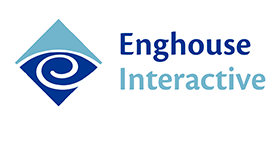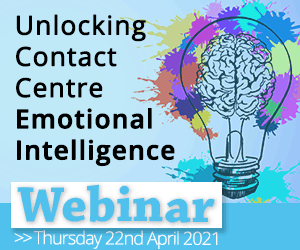The last twelve months have been difficult for everyone working in customer service. As we move forward with new hybrid ways of working, agents, managers and businesses will face fresh challenges.
How can they successfully navigate these changes and deliver service that delights customers, while retaining and nurturing staff?
The answer is to focus on emotional intelligence, as a recent Call Centre Helper webinar, sponsored by Enghouse Interactive outlined.
The event brought together experts Sandra Thompson from Ei Evolution, Annamarie Quinn of Sensée and Jeremy Payne of Enghouse Interactive for a discussion that defined emotional intelligence, outlined its benefits, and highlighted how it can be nurtured within the contact centre.
Explaining Emotional Intelligence
First, what is emotional intelligence (EI) – and how does it differ from empathy? Sandra defined it as “Your ability to recognise and understand emotions in yourself and others. It’s your ability to manage your behaviour and relationships.” Empathy is part of it, but it includes more active skills too. Annamarie explained that it covers:
- Self-awareness
- Self-regulation
- Social awareness
- Relationship management
The benefits it brings to both individuals and businesses are enormous:
- Increased productivity from those practising EI
- Reduced friction/conflict in the workplace – lowering employee grievances and staff turnover
- Stronger relationships with customers, thus increasing sales and retention
- Improved personal physical and mental health
Understanding the Importance of EI
EI is not something that you just learn once – it needs to be constantly worked at and has to be supported by the culture of your contact centre if you are to gain consistent benefits, both internally and with customers.
Backing this up, a poll on the webinar found that over half (53%) of those attendees measured customer emotion in some way – with the majority (43%) doing so indirectly.
Over 85% said that it was very important that agents displayed empathy during interactions – as Jeremy pointed out, this is the key differentiator that humans have over AI and automated channels such as chatbots and self-service, and must therefore be supported and nurtured.
Building EI in Your Team and Culture
On a personal level, there is a whole range of ways to increase your EI, starting with recognising that you are not at the mercy of your emotions and can learn to better control them and respond in a measured way to the outside world, rather than reacting instantly to stimuli.
Sandra highlighted useful techniques such as practising breathing, taking mindful walks, journaling and spending time in silence.
At a corporate level, attendees shared their own tips, based around creating the right culture where people feel they have the psychological safety to talk about their emotions.
It should be part of everything that an organisation does – one company explained it was covered within onboarding training, with regular refresher sessions, and that management led and displayed EI themselves.
Another tip was for agents and managers to put themselves in the position of the person they were talking to, in order to better understand their motivations and frustrations.
Annamarie agreed with the need for an open culture and explained that building EI starts with recruitment and has to be constantly nurtured, especially in a hybrid environment.
EI underpins many of the broader skills required in the contact centre – as shown by a poll on the webinar. 59% of attendees listed patience and listening as a top three skill for agents, followed by empathy (53%), problem-solving, and flexibility (51%).
Overcoming the Barriers to EI
Given the importance of EI-based skills and the clear benefits that it brings, what stops contact centres from giving it a higher profile in their operations? Annamarie pointed out that there can sometimes be a disconnect between KPIs that measure factors such as handling time and calls per hour and the need to invest time in building a rapport and listening to customers.
How agent performance is measured therefore has to be aligned with EI if it is to be adopted successfully across the organisation.
EI not only improves service externally but benefits agents and managers, helping them manage their own mental and physical health. At a time of high pressure, the biggest causes of stress for agents were seen to be broken processes (raised as a top three issue by 62% of webinar attendees), unhappy customers (44%) and high contact volumes (35%).
This all showed that advisors and agents want to do their best, but as Jeremy explained they can be held back by processes that required them to access multiple systems, transfer calls or make it difficult for them to respond to customers.
Hybrid working potentially exacerbates these issues, with many organisations struggling to make all their systems available to a distributed workforce who miss the social elements of being in the same building.
The Positive Impact of Technology
Provided the right culture is in place, technology can help support EI – for example by using the same tools for measuring customer satisfaction and pointing them inwards at agents within the contact centre.
Jeremy outlined how applications such as Real-Time Speech Analytics (RTSA) can monitor conversations and trigger interventions from supervisors if agents are showing signs of increased pressure, while simple Happy/Sad emojis in call wrap-ups can provide clues to agent engagement.
Self and social service can reduce the volume of routine calls that agents have to deal with, giving them more time to focus on more complex, emotionally involved interactions.
Above all, collaboration tools, such as Microsoft Teams, can help, underpinning hybrid working and connecting people in Sandra’s view. Attendees agreed, with 58% seeing such solutions as having the biggest impact on employee engagement, way ahead of omnichannel (12%) and video (10%).
The pandemic and the shift to hybrid working has highlighted the importance of emotional intelligence to creating and maintaining a successful, high-performing contact centre.
To learn more about how to apply EI within your organisation watch the full Call Centre Helper webinar here.
This blog post has been re-published by kind permission of Enghouse Interactive – View the Original Article
For more information about Enghouse Interactive - visit the Enghouse Interactive Website
Call Centre Helper is not responsible for the content of these guest blog posts. The opinions expressed in this article are those of the author, and do not necessarily reflect those of Call Centre Helper.
Author: Enghouse Interactive
Published On: 5th May 2021 - Last modified: 14th Jun 2024
Read more about - Guest Blogs, Enghouse Interactive, Jeremy Payne






 Enghouse Interactive delivers technology and expertise to help bring your customers closer to your business through its wide range of customer contact solutions.
Enghouse Interactive delivers technology and expertise to help bring your customers closer to your business through its wide range of customer contact solutions. 








